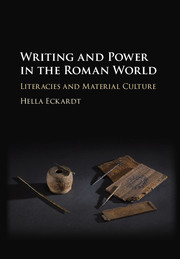Refine search
Actions for selected content:
23990 results in Ancient history
Biographical Note
-
- Book:
- Sociological Studies in Roman History
- Published online:
- 20 October 2017
- Print publication:
- 02 November 2017, pp xviii-xviii
-
- Chapter
- Export citation
Chapter 9 - Proverbs and Other Literature
- from Part II - The Texts
-
- Book:
- Women's Writing of Ancient Mesopotamia
- Published online:
- 23 October 2017
- Print publication:
- 02 November 2017, pp 187-209
-
- Chapter
- Export citation
Index
-
- Book:
- Sociological Studies in Roman History
- Published online:
- 20 October 2017
- Print publication:
- 02 November 2017, pp 558-605
-
- Chapter
- Export citation
Afterword - On the Probable Age Structure of the Roman Population
- from 4 - Graveyards for Historians*
-
-
- Book:
- Sociological Studies in Roman History
- Published online:
- 20 October 2017
- Print publication:
- 02 November 2017, pp 135-159
-
- Chapter
- Export citation
Tables
-
- Book:
- Women's Writing of Ancient Mesopotamia
- Published online:
- 23 October 2017
- Print publication:
- 02 November 2017, pp xii-xii
-
- Chapter
- Export citation
Copyright page
-
- Book:
- Sociological Studies in Roman History
- Published online:
- 20 October 2017
- Print publication:
- 02 November 2017, pp i-iv
-
- Chapter
- Export citation
Figures
-
- Book:
- Sociological Studies in Roman History
- Published online:
- 20 October 2017
- Print publication:
- 02 November 2017, pp v-vi
-
- Chapter
- Export citation
Bibliography
-
- Book:
- Sociological Studies in Roman History
- Published online:
- 20 October 2017
- Print publication:
- 02 November 2017, pp 556-557
-
- Chapter
- Export citation
Index of Place Names
-
- Book:
- Women's Writing of Ancient Mesopotamia
- Published online:
- 23 October 2017
- Print publication:
- 02 November 2017, pp 233-235
-
- Chapter
- Export citation
Afterword - Economic Growth and Towns in classical Antiquity
- from 5 - Economic Growth and Towns in Classical Antiquity*
-
-
- Book:
- Sociological Studies in Roman History
- Published online:
- 20 October 2017
- Print publication:
- 02 November 2017, pp 160-212
-
- Chapter
- Export citation
Chapter 2 - Mesopotamian Women
- from Part I - Introduction
-
- Book:
- Women's Writing of Ancient Mesopotamia
- Published online:
- 23 October 2017
- Print publication:
- 02 November 2017, pp 3-15
-
- Chapter
-
- You have access
- HTML
- Export citation
Chapter 5 - Hymns, Poems, and Prayers
- from Part II - The Texts
-
- Book:
- Women's Writing of Ancient Mesopotamia
- Published online:
- 23 October 2017
- Print publication:
- 02 November 2017, pp 39-50
-
- Chapter
- Export citation
12 - Christian Number and its implications*
-
- Book:
- Sociological Studies in Roman History
- Published online:
- 20 October 2017
- Print publication:
- 02 November 2017, pp 398-431
-
- Chapter
- Export citation
Chapter 8 - Oracles
- from Part II - The Texts
-
- Book:
- Women's Writing of Ancient Mesopotamia
- Published online:
- 23 October 2017
- Print publication:
- 02 November 2017, pp 159-186
-
- Chapter
- Export citation
Part II - The Texts
-
- Book:
- Women's Writing of Ancient Mesopotamia
- Published online:
- 23 October 2017
- Print publication:
- 02 November 2017, pp 25-36
-
- Chapter
- Export citation

Writing and Power in the Roman World
- Literacies and Material Culture
-
- Published online:
- 31 October 2017
- Print publication:
- 26 October 2017
Twelve - Conclusion
- from Part III - Writing Equipment in Funerary Contexts and the Expression of Identities
-
- Book:
- Writing and Power in the Roman World
- Published online:
- 31 October 2017
- Print publication:
- 26 October 2017, pp 224-232
-
- Chapter
- Export citation
10 - The Functions of Outsider Designations in the Pastoral Epistles and 1 Peter
-
- Book:
- Outsider Designations and Boundary Construction in the New Testament
- Published online:
- 11 October 2017
- Print publication:
- 26 October 2017, pp 208-242
-
- Chapter
- Export citation
Figures
-
- Book:
- Author and Audience in Vitruvius' <I>De architectura</I>
- Published online:
- 16 November 2017
- Print publication:
- 26 October 2017, pp x-xi
-
- Chapter
- Export citation
Five - Metal Inkwells in the Roman Empire
- from Part II - A Case Study
-
- Book:
- Writing and Power in the Roman World
- Published online:
- 31 October 2017
- Print publication:
- 26 October 2017, pp 68-107
-
- Chapter
- Export citation
